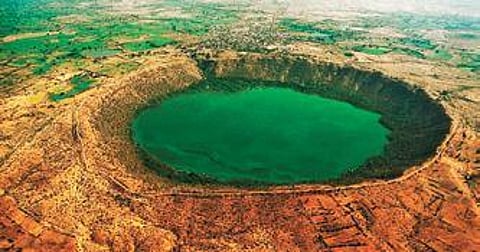

MUMBAI: Nestled in the Deccan Plateau region, the Lonar lake in Maharashtra has been declared as a wetland site of international importance under the Ramsar conservation treaty. This is Maharashtra’s second Ramsar site after Nandur Madhmeshwar in Nashik. The inclusion of Lonar lake takes the total number of Ramsar sites in India to 41.
Ramsar sites are designated wetlands that are deemed to have international importance. “Lonar lake on the Deccan Plateau is an endorheic or closed basin, almost circular in shape, formed by a meteorite impact onto the basalt bedrock. The site includes the lake as well as escarpments, which form the crater walls, and forested zones. The lake is high in salinity and alkalinity… but threatened by household sewage, urban wastewater and by unsustainable tourism,” read the convention’s declaration.
Located in Buldhana district, 500 km away from Mumbai, the lake was formed after a meteorite hit the Earth around 50,000 years ago. The world’s only high velocity impact lake formed in basaltic rock is said to be identified by a British officer CJE Alexander in 1823.
“I’m glad that the Lonar Crater is now officially a Ramsar Site. Having seen it for the first time in 2004, it is a sight that captivates everyone. It has its own significance in the world of Biodiversity, Tourism and Geology,” Aaditya Thackeray, environment and tourism minister tweeted.
The declaration comes as a Diwali gift for environment lovers, forest minister Sanjay Rathod said, adding that it is a matter of pride for the forest department and the entire state. “The lake was first proposed as a Ramsar site in 2017 by the forest department. Now, it has been approved... It will help to bring the international tourist and attractions. It is a major boost for eco-tourism sector.” The lake was last in news when scientists and locals were taken by surprise when the water turned pink in June earlier this year.